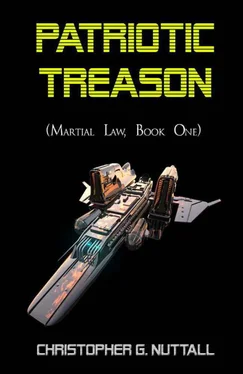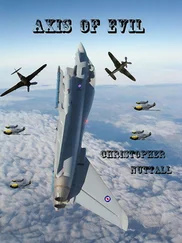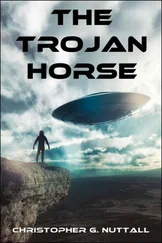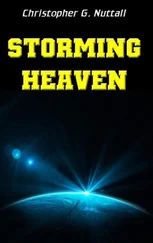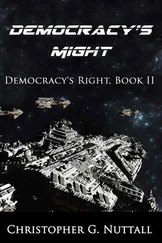Christopher Nuttall - Patriotic Treason
Здесь есть возможность читать онлайн «Christopher Nuttall - Patriotic Treason» весь текст электронной книги совершенно бесплатно (целиком полную версию без сокращений). В некоторых случаях можно слушать аудио, скачать через торрент в формате fb2 и присутствует краткое содержание. Год выпуска: 2011, Жанр: Космическая фантастика, Боевая фантастика, на английском языке. Описание произведения, (предисловие) а так же отзывы посетителей доступны на портале библиотеки ЛибКат.
- Название:Patriotic Treason
- Автор:
- Жанр:
- Год:2011
- ISBN:нет данных
- Рейтинг книги:3 / 5. Голосов: 1
-
Избранное:Добавить в избранное
- Отзывы:
-
Ваша оценка:
- 60
- 1
- 2
- 3
- 4
- 5
Patriotic Treason: краткое содержание, описание и аннотация
Предлагаем к чтению аннотацию, описание, краткое содержание или предисловие (зависит от того, что написал сам автор книги «Patriotic Treason»). Если вы не нашли необходимую информацию о книге — напишите в комментариях, мы постараемся отыскать её.
Patriotic Treason — читать онлайн бесплатно полную книгу (весь текст) целиком
Ниже представлен текст книги, разбитый по страницам. Система сохранения места последней прочитанной страницы, позволяет с удобством читать онлайн бесплатно книгу «Patriotic Treason», без необходимости каждый раз заново искать на чём Вы остановились. Поставьте закладку, и сможете в любой момент перейти на страницу, на которой закончили чтение.
Интервал:
Закладка:
Christopher G. Nuttall
PATRIOTIC TREASON
Part I: Ensign
Prologue
From: An Unbiased History of the United Nations . Williamson, Mike. Baen Historical Press, Heinlein, 2555.
We have seen in the preceding chapters how the factors of improved access to space, growing ethnic and international conflict and endless Wrecker attacks led to the exodus of human industry to the solar system, where safety could be guaranteed. The construction of the first orbital towers, the development of fusion power and — not coincidentally — ever-harsher regulations on Earth ensured that the space-based communities would lose most of their loyalty to Earth. The development of the Jump Drive by Professor Kratman in 2156 merely cemented that trend.
The first viable extra-solar colony world was discovered in 2157 and settled under the auspices of the UN. The land was shared out among interested groups who could afford space on the first colony ships — and the vast bribes paid to various UN bureaucrats — and those who were victims of ‘historical oppression.’ The result, for reasons that will be examined later, was a catastrophe of the first order. The next seventeen worlds to be settled by the human race were established by various nation-states — America, Britain, China, France, Russia and many others — and immigration quotas were firmly centred on those who could fit in. Although this policy was regarded — not entirely without reason — as racist, the UN was unable to counter it, as national armed forces were still a significant power. Other worlds, including Heinlein, Balboa and Williamson’s World, were settled according to a political ideal, or by corporate interests. By 2200, there were nearly one hundred and eighty worlds settled by the human race, with an ever-growing sphere of exploration and secret settlement.
The unintended consequence of this development was that it allowed the UN to consolidate its power on Earth and, later, throughout the solar system. There had always been a trend towards transnational institutions and this only accelerated as nationalists or patriots emigrated from their countries to newer pastures. As the UN tightened its grip, the United Nations Peace Force became the dominant military power of the world and national armed forces were either disarmed or encouraged to depart to the outer worlds. The growing social collapse over much of Earth — and resentment among the so-called Third World for years of semi-imaginary offences committed by the richer nations — only encouraged further emigration. In short, the UN’s bid for global power had succeeded itself to death. It had inherited a still-breathing corpse.
This was not immediately appreciated by the UN General Assembly, or the bureaucrats, who were by that time the real rulers of the planet. It became staggeringly clear when attempts to settle newer worlds based on past historical grievances tended to fail spectacularly. Worse, Earth’s production system was falling apart — by now, the planet was completely dependent on imported goods from the solar system — and the planet’s population was eating itself to death. The UN had either driven away or killed the men and women who could have solved the problems, and compounded their crimes by making it impossible for new ones to appear.
It was a problem that required a firm grasp of reality and ruthless measures to survive, all of which were politically impossible. Instead, the UN looked for another answer. It had always claimed jurisdiction over the extra-solar planets, the bureaucrats reasoned, and surely it was right for them to aid Earth in her hour of greatest need. The one element of the UN that had continued to work fairly well, insofar as anything worked fairly well, was the military arm, which had been confronted with endless rebellions on Earth against UN authority. The Generals drew up a plan, dispatched the fleet, and sat back, fully expecting victory and loot for Earth’s starved economy.
The plan didn’t go exactly as they had predicted.
In fact, it went spectacularly wrong.
The outer worlds didn’t recognise the authority of the UN. Many of their parents and grandparents had fled the UN’s growing control over their lives. They had built their new worlds for themselves, not for the UN to loot. The resistance started almost at once and, while the UNPF was extremely powerful, rapidly became impossible to suppress quickly. The UN found itself caught up in an insurrection on a galactic scale. Victory was as distant as ever.
It was into this world that John Walker was born.
Chapter One
The principle requirement for an officer serving in the UNPF is political reliability; i.e. he or she is fully aware of and dedicated to the UN’s official purpose. The courses at the Peace Academy (Space Studies) are therefore largely dedicated to political indoctrination sessions, often at the expense of competency. UNPF cadets and trainees, therefore, are often brutally unprepared for the hazards of space service. At least a fifth of newly-minted Ensigns die within the first year of their active service.
-Thomas Anderson. An Unbiased Look at the UNPF . Baen Historical Press, 2500.“Look at her,” Ensign Roger Williamson said. “Isn’t she magnificent?”
I couldn’t help, but agree. Even docked at Orbit Seven, the largest UNPF space station orbiting Luna, UNS Jacques Delors was an impressive sight. Two hundred meters long, shaped rather like a child’s dream starship, it was painted the bright white and blue colours of the United Nations Peace Force. It bristled with weapons and sensor modules and gave the impression, somehow, of being new. We knew, of course, that it was over ten years old, but it didn’t look it. I stared, trying to drink in all the details of my new posting, the first since I — we — had graduated the Peace Academy.
“She is,” I breathed, awed. The starship just took my breath away. I glanced down at my watch-terminal and allowed myself a moment of relief. We were only seven minutes late, hardly worth worrying about. We could stay and stare at the starship for several more minutes before we walked down the docking tube and boarded her formally. “The images didn’t do her justice.”
“You never said a truer word, John,” Roger said. “Muna, what do you think?”
“I think I’m glad to have made it through the Academy,” Muna said, flatly. Ensign Muna Mohammad, for reasons I never fully understood, had almost failed the Academy and nearly been sent home in disgrace. “I also think that we should hurry up and board her.”
Roger snorted. “There’s no need to rush,” he assured her. “The Captain won’t leave us behind, I’m sure.”
Ensign Rolf Lommerde coughed. “For those of us who do not have highly-placed relations,” he said, “it is rather less easy to be sure of our own safety.”
“I know,” Roger said, seriously. He was an alright type really, despite his family’s connections in the vast UN bureaucracy that ran the United Nations. He’d certainly never traded on them to get better treatment from our instructors back at the Academy. “Sally? Ellen? Should we go…?”
“Yeah,” Ellen said. She picked up her carryall with a sigh. “We want to make a good impression, don’t we?”
Roger led the way down to the docking tube, which was guarded by a pair of armed and armoured Marines. I studied them with interest as Roger explained who we were; their armour, I had been assured, could stand off either bullets or laser beams. They both looked tough and scarred from the wars; indeed, it took me several minutes to realise that one of them was actually female. I wouldn’t have dared try to chat her up in a bar, had I known that she was a Marine. The Marines had a reputation for being utterly unforgiving in a fight.
Читать дальшеИнтервал:
Закладка:
Похожие книги на «Patriotic Treason»
Представляем Вашему вниманию похожие книги на «Patriotic Treason» списком для выбора. Мы отобрали схожую по названию и смыслу литературу в надежде предоставить читателям больше вариантов отыскать новые, интересные, ещё непрочитанные произведения.
Обсуждение, отзывы о книге «Patriotic Treason» и просто собственные мнения читателей. Оставьте ваши комментарии, напишите, что Вы думаете о произведении, его смысле или главных героях. Укажите что конкретно понравилось, а что нет, и почему Вы так считаете.
